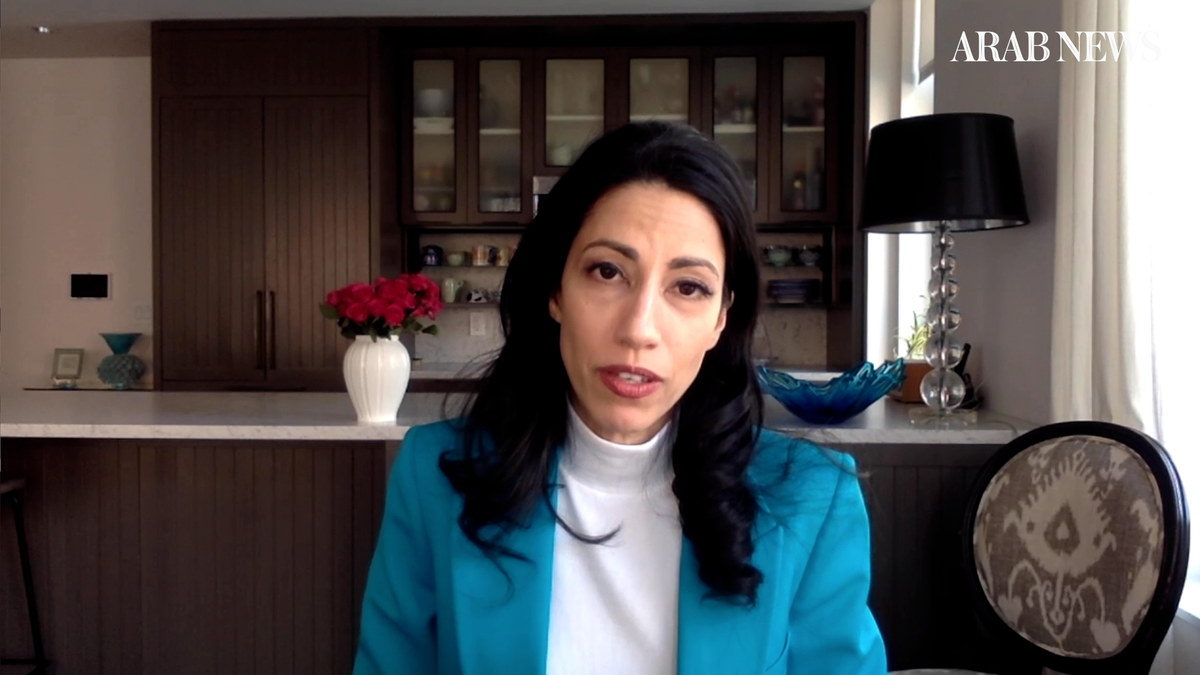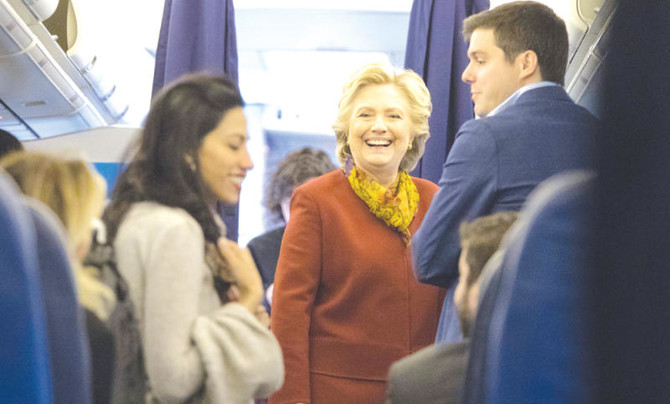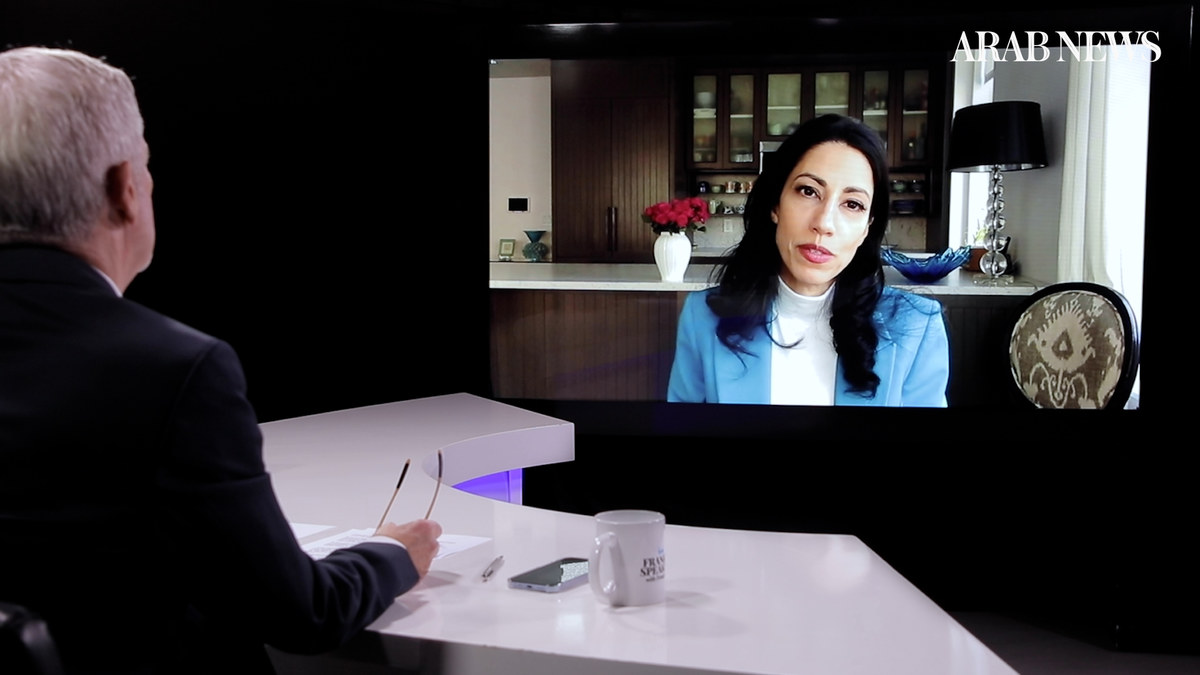DUBAI: Muslims were made the “bogeyman” by some politicians in the US at the time of the 2016 election won by former President Donald Trump, a leading American Muslim has told Arab News.
Huma Abedin, chief of staff of the defeated Democratic Party candidate Hillary Clinton, said she endured calls for her investigation by a Republican congressman in 2012 on the flimsy evidence that she and her family were practicing Muslims, with the prejudice intensifying during the 2016 campaign.
“I just want to take a step back and remind people this was 2012 and I believe the experience those of us had was really an appetizer for what was to come — this idea that you could label somebody ‘the other’ and make them the bogeyman. I believe my faith was made a bogeyman in that 2016 election,” she said.
Abedin, who recently published a book about her experiences in US politics and her time growing up in Saudi Arabia, shared her forthright views on “Frankly Speaking,” the series of video interviews with leading global policymakers.
In a wide-ranging conversation, she also spoke of the growing divisions within US politics and society, the empowerment of women in the American system, and her ill-starred marriage to former New York Congressman Anthony Weiner, which ended in scandal and divorce.

Human Abedin is shown on screen being interviewed on Frankly Speaking.
Accusations of anti-Muslim prejudice in the US political system are a striking part of her memoir, “Both/And: A Life in Many Worlds,” published last year.
“One of the reasons I wrote this book is because I wanted to share with Americans and with people what it is to be a Muslim American in this country, and it is why I wrote in detail about the accusations that my family faced in 2012, when I was working at the State Department,” Abedin said.
“I was attacked simply because I was Muslim and had two Muslim parents.”
The accusations were quickly discredited by a State Department review, but Abedin believes they were symptomatic of a wider deterioration in the standards of political life in the US.
“Do I see a divide in this country? Absolutely, we all do. And unless we are willing to step forward to continue to engage in public service, we have a choice in the kind of country we’re going to live in,” she said.
“It is very scary to see some of the language that’s out there in the world. Very scary.”

Abedin, who began her political career as a White House intern in 1996, said that while there were always differences between Republican and Democratic politicians, before 2016 these could be debated and resolved.
“The way I was raised in politics and public service was forcing differing opinions to the table, being able to leave the office and go down the street and have dinner together and hash out your differences. That has changed,” she said.
“It’s not the same Washington. It’s not. The parties have become so much more divided in terms of basic human common decency. That seems to have been really allowed to just disappear, and I’m very sad about that.”
Abedin was vice chair of the campaign to elect Clinton in 2016, when the candidate endured baseless calls from Trump for her prosecution and imprisonment on unspecified charges. A late-breaking investigation into Clinton’s emails by the FBI — subsequently discredited — hit her campaign hard, by some accounts costing her the election.
“I would argue that my boss actually did quite well (considering) the external forces. I write about this in detail in my book, everything from the misogyny (to) the attacks — when you have somebody every single day suggesting that you might go to jail without explaining why, as had been the case for her,” she said.
“The attacks (Clinton) had to endure multiple times a day, those things had an effect. (Plus) the FBI investigation — which had a late-breaking role in changing, altering the course of the election, in an election so tight that every little thing mattered — that was a big thing,” Abedin said.
“The forces against our party and our candidate really were quite overwhelming at that moment. So, I still get up every single day and I think about how our country would have been different today if (Clinton) had been elected in 2016.”
Another reason for Clinton’s defeat, she said, was “because she is a powerful, smart, ambitious woman and we are, in this country in my opinion, still afraid of powerful women.”
Born in the US, Abedin’s family moved to Saudi Arabia when she was a child, and she grew up in the Kingdom before she left for higher education in America. She returns frequently to Saudi Arabia with her son Jordan, and is impressed by the changes that have taken place since she lived there.
“First of all, you didn’t see women in stores (in the 1980s), you didn’t see the cultural events on the beach. When I was there a couple of years ago with my son, we went for face painting and on the beach and Ferris wheels. A lot of young Saudi men and women are working in small businesses, entrepreneurships.”

Huma Abedin, left, is seen with Democratic presidential candidate Hillary Clinton on the campaign trail in New York during the 2016 US presidential election. (AP file)
She added: “I will always have a very tender place in my heart for the place that was home for me for so long, that I associated with my father. My father is buried there, in Makkah. So, for me to see the progress is amazing, it’s really amazing.”
Before she embarked on her career in Washington political circles, Abedin was briefly a journalist for Arab News.
“I had applied for a White House internship and then left to go home for the summer, and it was Khaled Al-Maeena, who was then the editor-in-chief, who offered me a position with a summer job.”
She said: “Arab News is what we read in our home every single day. It was our New York Times. So, if you had asked me in 1995 would I be doing an interview like this in 25 years, I would say absolutely no way, no how. But it’s a thrill.”
In her memoir Abedin talks candidly about her marriage, and the misgivings she had when she first met Weiner, a New York congressman of Jewish background and then a rising star in Democrat circles in the city.
“I think any Muslim who’s watching will understand our faith, our belief. Men, Muslim men, are allowed to marry outside the religion, (but) it’s much more difficult for Muslim women to marry outside the faith. That really in the end has to do with paternity: If there are children born of that marriage, generally the child takes the father’s religion and so it was a huge crisis of conscience for me,” she said.

The marriage ended when Weiner was jailed for sexual crimes propagated via social media, but in the process affected the 2016 election campaign. “I felt an entire responsibility for that defeat,” Abedin said.
She was a victim of intense media scrutiny during the Weiner scandal, but eventually accepted that the press was just doing its job in covering a major news story. “I understood. It wasn’t easy, but I understood,” she said.
Abedin said that the Democrats under President Joe Biden face an uphill struggle in the upcoming mid-term elections, which traditionally go badly for the incumbent’s party.
“I think the COVID-19 pandemic has presented all kinds of unanticipated challenges, and I think our party has its work cut out for it in November. We have a lot of work to do and we’ve got to keep the enthusiasm, get people out (to vote). It’s going to be hard,” she said.
Abedin, who combines insider knowledge of the US political system with an understanding of Saudi Arabia and the Arab world, does not rule out an ambassadorial role in the future.
“I am open to all kinds of opportunities and exploring different things. What that is I don’t know yet, but ambassador sounds really good. I just have to figure out — ambassador to what and for what and how? But I like that actually,” she said.

























